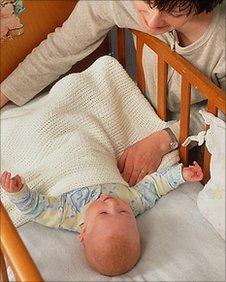Parenting not income key to tackling inequality - Field
- Published

How parents nurture their children is critical, Mr Field says
Instead of increasing benefits for children, ministers should put the money into improving parenting skills, the government's poverty czar has said.
In a major report, Labour MP Frank Field says improving the life chances of under fives is the key to cutting social inequality.
But spending more on benefits was not always the best way to bridge "huge class differences".
Labour said "good intentions" would mean little if child support was cut.
Mr Field said he was urging the government to adopt a new approach in its fight against child poverty, focused on better support for parents of young children to improve their life chances.
'Pavlovian dog'
He told the BBC News Channel income was not the only factor in determining life chances - because some children from poor backgrounds did well, while others failed.
"In some years the government shouldn't be like a Pavlovian dog, jump up and say we are increasing, as we have always done, benefits for children.
"Let's have a debate with us in Parliament and the country - could all, or some, of that money be better spent, not increasing benefits, but in that year going to build up the foundation years."
Frank Field: "Reading to your child... is one of the decisive things which ranks whether your child is going to fly or founder"
Mr Cameron said Mr Field's report, external was a "highly valuable" contribution to the national debate that must take place on the issue.
A former Labour minister, who was asked by Tony Blair "to think the unthinkable" on welfare reform in 1997, Mr Field has been critical of efforts to reduce inequality in recent years.
Mr Field's report concludes that, for many children from disadvantaged backgrounds, by the time they start school "life's race is by then already effectively over".
New thinking on education, childcare and benefits was needed to "prevent poor children from becoming poor adults", Mr Field says.
The approach should be to "change the shape of the distribution of income in this country by eliminating the larger numbers of people who currently leave school to face, at best, a lifetime of low pay and, at worse, unemployment," he argues.
Mr Field is calling for a new set of indicators to be devised help measure a child's physical, emotional and cognitive development at the age of three and five.
These should be published annually by the government and applicable at local levels, he says, so parents can see what progress their children are making and hold local authorities and other providers of early years assistance to account.
Parenting
Allied to this, he is urging reform of the network of Sure Start childrens' centres, of which there are 3,500 in the UK, as part of increased focus on childrens' "foundation years".
He says future contracts for running the centres should be put out to tender so that voluntary bodies, GPs, schools and housing associations are able to bid for them, and there should be financial incentives to target the most vulnerable and "hardest to reach" parents.
Mr Field, who has said too many people lack basic parenting abilities, wants all schools to teach parenting and life skills, and says Sure Start has an important role to play in facilitating this.
"Parents are the key drivers in determining their children's life chances," Mr Field adds.
"It is not so much who parents are - what their jobs are - but what parents do. How they nurture their children, the evidence shows, determines a child's life race."
Money spent on increasing child-related benefits every year could be better spent in other ways, Mr Field suggests, such as supporting nursery education and more flexible childcare.
Responding to the report, Mr Cameron and his deputy Nick Clegg said they welcomed the idea of life-chance indicators as a way of looking at poverty and lack of opportunity "in the round".
"Income is one of a wide range of factors that define and describe poverty," they say in a letter to Mr Field. "We need to look at people's experience of poverty in all its dimensions, and in real life, not merely in narrow statistical terms."
They add: "As your report makes clear, we also need to focus on people trapped in poverty, sometimes over generations. Poor children are at a high risk of becoming poor adults. This violates any notion of fairness."
Cuts
Labour said it was willing to consider "fresh ideas" as a way of helping the UK meet the last government's goal of abolishing child poverty by 2020.
"I welcome any new thinking that keeps poverty and social mobility on the agenda, especially the important role that parents play," Shadow Work and Pensions Secretary Douglas Alexander said.
"No amount of good intentions, however, can disguise the fact that George Osborne's cuts to child care support and work incentives will make it harder to reduce poverty."
The TUC said the report understated the financial pressure on families having to live on the breadline.
"We remain a country with an exceptional level of economic inequality that needs significant fundamental structural change and government investment," general secretary Brendan Barber said.
Imran Hussain, head of policy for Child Poverty Action Group, said: "There are some good ideas on early years in Frank Field's report, but we must avoid too narrow a focus and retain the broad strategy across income, disability, fair pay, childcare, housing and basic living costs."
- Published12 October 2010
- Published5 June 2010